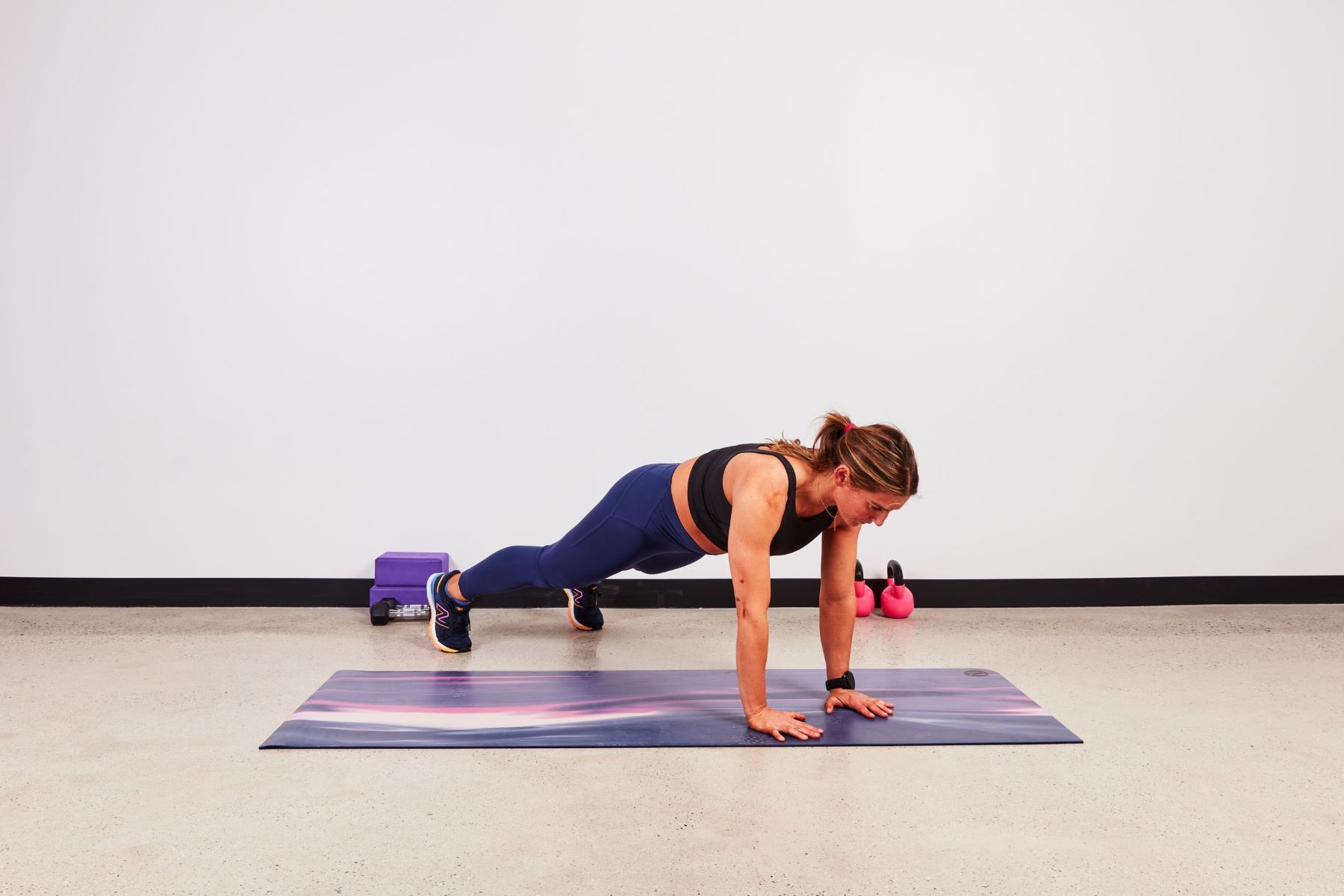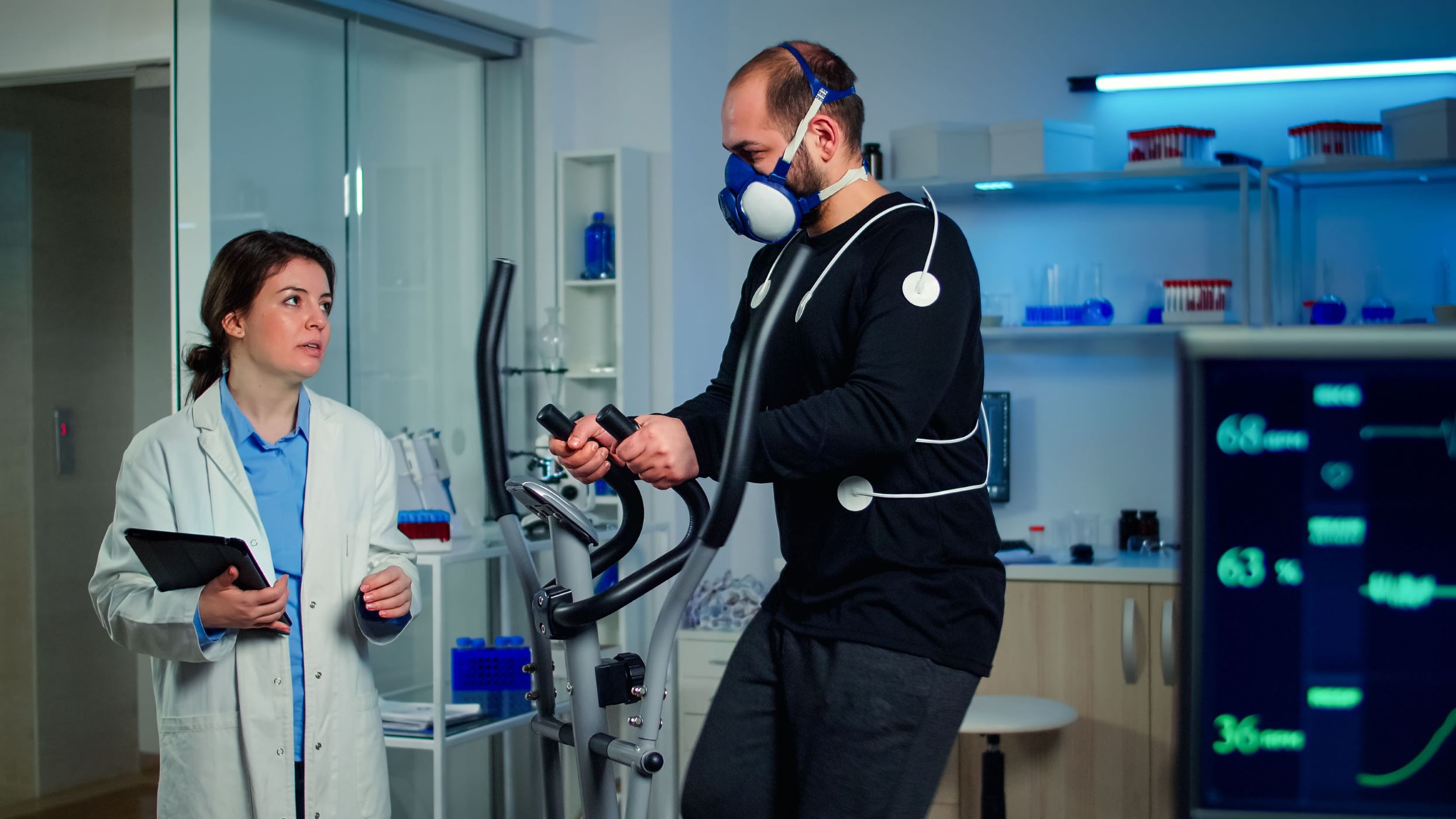Home>Misc>Featured>How Does Cardiovascular Fitness Allow You To Exercise Longer?


Featured
How Does Cardiovascular Fitness Allow You To Exercise Longer?
Modified: August 21, 2023
Improve your cardiovascular fitness and exercise for longer with featured tips and techniques. Discover how to push your limits and achieve your fitness goals.
Introduction
Have you ever noticed how some people seem to be able to exercise for longer periods of time while others tire out quickly? The answer lies in their cardiovascular fitness. Cardiovascular fitness plays a crucial role in allowing individuals to exercise for extended durations without feeling fatigued. Understanding how cardiovascular fitness impacts exercise duration can help you optimize your fitness routine and achieve your fitness goals more effectively.
Cardiovascular fitness, also known as cardiovascular endurance or aerobic fitness, refers to the ability of the cardiovascular system to efficiently deliver oxygen and nutrients to the muscles during physical activity. It is influenced by various factors such as genetics, overall health, and regular exercise habits. Improved cardiovascular fitness offers a multitude of benefits, including a lower risk of heart disease, improved metabolism, weight management, and enhanced overall endurance.
So, how does cardiovascular fitness allow you to exercise for longer periods? The answer lies in the physiological adaptations that occur within your body as a result of improved cardiorespiratory fitness.
When you engage in regular cardiovascular exercise, several key changes take place within your body. First, your heart becomes stronger and more efficient at pumping blood. This means that with each heartbeat, a greater volume of oxygen-rich blood is delivered to your muscles, providing them with the necessary fuel to sustain exercise for longer durations. Additionally, your lungs also become more efficient at oxygen uptake, allowing them to extract oxygen from the inhaled air more effectively.
Moreover, individuals with higher levels of cardiovascular fitness have better capillary density within their muscles. Capillaries are tiny blood vessels that deliver oxygenated blood directly to the muscle fibers. With increased capillary density, more oxygen can be delivered to the muscles, allowing them to work efficiently for longer durations before fatigue sets in.
Another factor that impacts exercise duration is the body’s ability to utilize energy efficiently. When cardiovascular fitness improves, the body becomes more proficient at utilizing stored energy sources, such as glycogen and fat, during exercise. This leads to a delayed onset of fatigue and allows individuals to exercise for longer periods without feeling overly tired.
Overall, having good cardiovascular fitness allows individuals to exercise for longer durations because of the increased oxygen delivery to the muscles, efficient energy utilization, enhanced oxygen uptake and utilization, and improved endurance capacity. By incorporating regular aerobic exercises such as running, cycling, swimming, or brisk walking into your fitness routine, you can improve your cardiovascular fitness and enjoy the benefits of being able to exercise for longer periods.
What is cardiovascular fitness?
Cardiovascular fitness, also referred to as cardiovascular endurance or aerobic fitness, is a measure of how efficiently your cardiovascular system can supply oxygen and nutrients to your muscles during physical activity. It is a key component of overall fitness and plays a significant role in determining your endurance and stamina levels.
Cardiovascular fitness is influenced by various factors, including genetics, age, sex, and lifestyle choices. Regular aerobic exercise is one of the most effective ways to improve cardiovascular fitness. Activities such as running, cycling, swimming, brisk walking, and dancing get your heart rate up and increase your breathing rate, challenging your cardiovascular system and promoting its adaptation and improvement over time.
When you engage in aerobic exercise, your heart pumps more blood per beat, and your breathing rate increases to deliver oxygen to your working muscles. This increased demand for oxygen triggers various physiological adaptations within your body that enhance cardiovascular fitness.
Some of the benefits of having good cardiovascular fitness include:
- Lower risk of heart disease: Regular aerobic exercise helps strengthen your heart muscles, improve blood flow, and reduce your risk of developing cardiovascular diseases such as heart attacks, strokes, and high blood pressure.
- Improved metabolism: Cardiovascular fitness boosts your metabolism, helping you burn more calories and maintain a healthy body weight.
- Enhanced endurance: With improved cardiovascular fitness, you can perform physical activities for longer durations without feeling fatigued, allowing you to enjoy sports, hobbies, and everyday tasks with greater ease.
- Increased energy levels: Regular aerobic exercise stimulates the release of endorphins, which are natural mood-boosting chemicals in the body. This can result in increased energy levels and improved mental well-being.
Regular aerobic exercise can also have positive effects on other aspects of your health, such as reducing the risk of chronic diseases like diabetes and improving sleep quality.
It is important to note that cardiovascular fitness is a relative measure, meaning that what may be considered good cardiovascular fitness for one person may be different for another. Factors such as age, sex, and overall health can influence an individual’s cardiovascular fitness level.
Incorporating aerobic exercises into your fitness routine, along with strength training and flexibility exercises, can help you improve your cardiovascular fitness and overall health. It is recommended to aim for at least 150 minutes of moderate-intensity aerobic exercise or 75 minutes of vigorous-intensity aerobic exercise per week to maintain and enhance cardiovascular fitness.
The benefits of cardiovascular fitness
Having good cardiovascular fitness offers a plethora of benefits for your overall health and well-being. Regular aerobic exercise, which improves cardiovascular fitness, can have a positive impact on various aspects of your physical and mental health. Let’s explore some of the key benefits:
- Reduced risk of cardiovascular diseases: One of the primary advantages of cardiovascular fitness is its ability to lower the risk of heart diseases, including heart attacks, strokes, and high blood pressure. Regular aerobic exercise strengthens the heart muscle and improves blood flow, which helps in maintaining a healthy cardiovascular system.
- Weight management: Engaging in cardiovascular exercises helps burn calories, making it an effective tool in managing body weight. By incorporating activities like running, swimming, or cycling into your fitness routine, you can increase your calorie expenditure, maintain a healthy weight, and reduce the risk of obesity and related health conditions.
- Improved respiratory function: Cardiovascular fitness is closely linked to respiratory function. Regular aerobic exercise helps strengthen the respiratory muscles, improves lung capacity, and enhances overall lung function. This can result in better oxygen uptake, increased lung efficiency, and improved endurance during physical activities.
- Increased energy levels: Engaging in cardiovascular exercises stimulates the release of endorphins, known as “feel-good” hormones, which can boost energy levels and improve your mood. Regular aerobic exercise can combat feelings of fatigue and enhance mental alertness, leaving you feeling more energized throughout the day.
- Enhanced mental well-being: Cardiovascular fitness has a positive impact on mental health. Regular aerobic exercise has been shown to reduce symptoms of anxiety and depression, improve overall mood, and promote better sleep quality. It can serve as a powerful stress buster and contribute to enhanced mental well-being.
- Increased endurance and stamina: Improved cardiovascular fitness leads to enhanced endurance and stamina levels, allowing you to engage in physical activities for longer periods without feeling excessively fatigued. This can greatly improve your performance in sports, recreational activities, and everyday tasks.
- Lower risk of chronic diseases: Regular aerobic exercise has been associated with a reduced risk of chronic conditions such as type 2 diabetes, certain types of cancer, and metabolic diseases. Maintaining good cardiovascular fitness is crucial for overall health and disease prevention.
- Longevity: Numerous studies have shown a strong correlation between cardiovascular fitness and longevity. Individuals with good cardiovascular fitness are more likely to live longer and have a higher quality of life as they age.
Overall, the benefits of cardiovascular fitness extend far beyond physical health. By incorporating regular aerobic exercise into your lifestyle, you can experience improvements in both your physical and mental well-being, leading to a healthier and more fulfilling life.
How does cardiovascular fitness impact exercise duration?
Cardiovascular fitness plays a crucial role in determining how long you can sustain physical activity before experiencing fatigue. It affects exercise duration through several physiological mechanisms that occur within the body. Let’s explore how cardiovascular fitness impacts exercise duration:
- Increased oxygen delivery to muscles: When your cardiovascular fitness improves, your heart becomes stronger and more efficient at pumping blood. This means that with each heartbeat, a greater volume of oxygen-rich blood is delivered to your muscles. The increased oxygen supply allows your muscles to work for longer periods before tiring out, thus extending your exercise duration.
- Efficient energy utilization: As cardiovascular fitness improves, your body becomes more adept at utilizing energy sources efficiently during exercise. This includes utilizing stored carbohydrates (glycogen) and fat as fuel for your muscles. Improved energy utilization delays the onset of fatigue, allowing you to exercise for longer durations without feeling excessively tired.
- Enhanced oxygen uptake and utilization: Regular aerobic exercise improves your lung capacity and efficiency, allowing for increased oxygen uptake during physical activity. This means that your body can extract more oxygen from the air you breathe in and utilize it more effectively to produce energy. The enhanced oxygen uptake and utilization contribute to improved endurance and extended exercise duration.
- Improved endurance capacity: Building cardiovascular fitness through regular aerobic exercise leads to adaptations within your muscles and cardiovascular system. These adaptations include increased capillary density and improved oxygen and nutrient delivery to your muscles. With more oxygen and nutrients being delivered to your muscles, they can work efficiently for longer periods of time, increasing your endurance capacity and allowing for extended exercise duration.
- Reduced perceived exertion: Individuals with higher cardiovascular fitness tend to have a lower perceived exertion during exercise. This means that they feel less fatigued and can sustain exercise for longer durations. The perception of effort is influenced by factors such as oxygen availability, energy utilization, and overall fitness level.
It is important to note that cardiovascular fitness is a result of consistent aerobic exercise over time. Gradually increasing the intensity and duration of your workouts can further improve your cardiovascular fitness, leading to even longer exercise durations.
By focusing on improving your cardiovascular fitness through activities like running, cycling, swimming, or any other aerobic exercises, you can enhance your body’s capacity to deliver oxygen, utilize energy efficiently, and increase endurance. Regular cardiovascular exercise can help you extend your exercise duration, allowing you to enjoy longer and more effective workouts.
Increased oxygen delivery to muscles
One of the key ways that cardiovascular fitness impacts exercise duration is through the increased delivery of oxygen to the muscles. When you engage in aerobic exercise and improve your cardiovascular fitness, your heart becomes stronger and more efficient at pumping blood.
With each heartbeat, a greater volume of oxygen-rich blood is sent to your muscles. This increased oxygen delivery is crucial for providing the necessary fuel to sustain physical activity for longer periods. Here’s how improved oxygen delivery to the muscles helps extend exercise duration:
- Greater oxygen availability: The primary role of oxygen during exercise is to produce energy. Oxygen is utilized in the mitochondria of your muscle cells to break down energy substrates, such as carbohydrates and fats, to generate ATP, the body’s main energy source. With increased cardiovascular fitness, more oxygen is delivered to your working muscles, ensuring an ample supply of oxygen for energy production.
- Reduced reliance on anaerobic pathways: As oxygen delivery to the muscles improves, your body becomes less reliant on anaerobic energy pathways. Anaerobic metabolism can provide energy quickly, but it is limited in duration and can produce fatigue-inducing waste products, such as lactic acid. By delivering more oxygen to the muscles, aerobic metabolism becomes the dominant energy pathway during exercise, leading to sustained energy production and delayed fatigue.
- Enhanced blood flow: Improved cardiovascular fitness leads to increased blood flow throughout your body, including to your muscles. This enhanced blood flow helps ensure that oxygen is efficiently delivered to the working muscles, while also removing waste products like carbon dioxide. The efficient oxygen-rich blood circulation allows your muscles to work continuously for longer durations without becoming oxygen-deprived.
- Optimized oxygen extraction: As cardiovascular fitness improves, your muscles adapt by increasing their capillary density. Capillaries are tiny blood vessels that deliver oxygenated blood directly to the muscle fibers. With more capillaries surrounding the muscle fibers, oxygen can be extracted more effectively. This results in a higher oxygen extraction rate, allowing the muscles to utilize oxygen more efficiently and sustain physical activity for longer periods.
- Improved recovery between bouts of exercise: Adequate oxygen delivery to the muscles not only facilitates energy production during exercise but also plays a role in recovery between bouts of exercise. With improved cardiovascular fitness, your body can replenish oxygen and remove waste products more efficiently during rest periods. This means that you’ll be able to recover faster between sets or during interval training, allowing for longer and more effective workout sessions.
By improving cardiovascular fitness through regular aerobic exercise, you optimize the delivery of oxygen to your muscles. This enables them to work efficiently for extended periods, postpone fatigue, and sustain physical activity for longer durations. Increased oxygen delivery is just one of the many ways that cardiovascular fitness impacts exercise duration, highlighting the importance of maintaining good cardiovascular health for overall fitness and performance.
Efficient energy utilization
Efficient energy utilization is another critical aspect of how cardiovascular fitness impacts exercise duration. When your cardiovascular fitness improves, your body becomes more proficient at utilizing energy sources, such as glycogen and fat, during exercise. This factor contributes to a delay in the onset of fatigue and allows you to exercise for longer durations without feeling excessively tired. Here’s how improved energy utilization enhances exercise duration:
- Optimized glycogen utilization: Glycogen is the stored form of glucose in your muscles and liver, serving as a primary energy source during exercise. With cardiovascular fitness, your body becomes more efficient at utilizing glycogen stores, allowing them to last longer. This means that you can sustain higher-intensity exercise or exercise for an extended period before depleting your glycogen stores and experiencing fatigue.
- Increased utilization of fat as fuel: As your cardiovascular fitness improves, your body becomes better at utilizing fat as an energy source during exercise. This adaptation is particularly beneficial during lower-intensity activities, where fat oxidation becomes a significant contributor to energy production. Improved fat utilization allows you to preserve glycogen stores for more intense bouts of exercise, thereby extending exercise duration.
- More sustained energy production: With efficient energy utilization, your body can provide a steady supply of energy throughout exercise, rather than experiencing rapid energy depletion. This sustained energy production delays the onset of fatigue, allowing you to maintain a higher level of performance for longer durations.
- Improved fuel efficiency: Improved cardiovascular fitness leads to enhanced oxygen delivery and utilization, which promotes greater fuel efficiency during exercise. The increased oxygen availability enables the muscles to utilize energy substrates more efficiently, reducing the production of waste products like lactic acid. This results in less fatigue and allows for prolonged exercise durations.
- Enhanced recovery capacity: Good cardiovascular fitness is associated with improved recovery capacity between exercise sessions. Efficient energy utilization allows for quicker replenishment of energy stores, such as glycogen, during recovery periods. This enables you to recover faster, allowing for more frequent, longer, and more effective workouts.
It’s important to note that efficient energy utilization during exercise is influenced by multiple factors, including training status, nutrition, and individual differences. Regular aerobic exercise, combined with a balanced diet that supports energy production and recovery, can optimize energy utilization and help extend exercise duration.
By improving your cardiovascular fitness, you can enhance your body’s ability to use energy efficiently during exercise. This translates to delayed fatigue, improved endurance, and extended exercise duration. Focus on maintaining a consistent aerobic exercise routine and adopting healthy nutritional practices to optimize energy utilization and maximize your performance.
Enhanced oxygen uptake and utilization
Enhanced oxygen uptake and utilization are crucial aspects of how cardiovascular fitness impacts exercise duration. As your cardiovascular fitness improves, your body becomes more efficient at taking in and utilizing oxygen during physical activity. This enhanced oxygen uptake and utilization play a significant role in extending exercise duration. Here’s how it works:
- Increased lung capacity: Regular aerobic exercise improves your lung function and capacity. As you engage in activities that challenge your cardiovascular system, your lungs adapt by becoming more efficient at oxygen uptake. This means that your body can extract more oxygen from the air you breathe in, allowing for a greater supply of oxygen to be available for energy production during exercise.
- Improved oxygen transport: The main role of the cardiovascular system is to transport oxygen-rich blood to the working muscles. With better cardiovascular fitness, your heart becomes stronger and can pump a greater volume of blood with each heartbeat. This increased cardiac output means that more oxygen can be delivered to your muscles, enhancing energy production and extending exercise duration.
- Enhanced oxygen utilization within the muscles: As cardiovascular fitness improves, your muscles adapt by increasing their ability to use oxygen efficiently. This adaptation allows for a higher utilization of oxygen during exercise, leading to improved aerobic metabolism. More oxygen being utilized within the muscles means more energy production, postponing fatigue, and allowing you to exercise for longer durations.
- Promotion of aerobic metabolism: Aerobic metabolism, which relies on the availability of oxygen, is the principal energy pathway during endurance activities. With enhanced oxygen uptake and utilization, your body becomes more efficient at utilizing aerobic metabolism for energy production. This pathway uses oxygen to burn carbohydrates and fats, providing a consistent and sustainable source of energy during exercise.
- Reduced reliance on anaerobic metabolism: Anaerobic metabolism, which occurs in the absence of sufficient oxygen, is responsible for producing energy rapidly but is limited in duration. By improving oxygen uptake and utilization, you reduce the reliance on anaerobic metabolism. This means that your body can sustain higher-intensity exercise for longer periods by predominantly utilizing aerobic metabolism, leading to extended exercise duration.
- Improved recovery between exercise bouts: Efficient oxygen uptake and utilization also play a role in post-exercise recovery. With better oxygen availability, your body can more quickly replenish oxygen stores and clear metabolic waste products, such as carbon dioxide. This improves recovery time between exercise bouts and allows for more frequent and longer-duration workouts.
By focusing on improving your cardiovascular fitness through regular aerobic exercise, you enhance your body’s ability to take in and use oxygen efficiently. This leads to increased oxygen availability, improved aerobic metabolism, and extended exercise duration. The combination of enhanced oxygen uptake and utilization is a key factor in optimizing your performance and achieving your fitness goals.
Improved endurance capacity
Improved endurance capacity is one of the primary benefits of cardiovascular fitness and a key factor in how it impacts exercise duration. Endurance refers to the ability to sustain physical activity for extended periods without experiencing excessive fatigue. As your cardiovascular fitness improves, so does your endurance capacity. Here’s how improved cardiovascular fitness enhances endurance and extends exercise duration:
- Increased oxygen supply: Cardiovascular fitness leads to improved oxygen delivery to the muscles. When you engage in aerobic exercise, your heart becomes stronger, and more blood is pumped with each heartbeat. This increased blood flow results in greater oxygen supply to the working muscles, which is essential for prolonged endurance and sustained performance.
- Enhanced energy production: Regular aerobic exercise and improved cardiovascular fitness enhance your body’s ability to generate energy efficiently. The supply of oxygen and nutrients to the muscles allows for optimized energy production through aerobic metabolism, which relies on oxygen and utilizes carbohydrates and fats for fuel. Enhanced energy production supports sustained endurance during physical activity.
- Reduction in perceived exertion: With improved cardiovascular fitness, you may experience a decrease in perceived exertion during exercise. Perceived exertion refers to how hard you feel like you are working. As your cardiovascular fitness improves, your body becomes more efficient at utilizing oxygen, reducing the stress on your cardiovascular system. This can make the exercise feel less demanding, allowing you to sustain it for longer durations.
- Decreased reliance on anaerobic pathways: Cardiovascular fitness enhances your body’s ability to rely more on aerobic metabolism, which is more sustainable for extended endurance activities. As aerobic metabolism becomes the dominant energy pathway, there is a reduced reliance on anaerobic metabolism, which produces waste products like lactic acid. By minimizing the accumulation of such waste products, you can delay fatigue and extend your endurance capacity.
- Improved recovery between bouts of exercise: Good cardiovascular fitness enables faster recovery between exercise sessions or intervals. Efficient oxygen utilization and waste product removal during recovery periods allow your body to rejuvenate more quickly, reducing muscle fatigue and allowing for subsequent bouts of exercise. This improves overall endurance capacity and extends exercise duration in subsequent sessions.
- Enhanced mental resilience: Endurance is not only a physical attribute but also a mental one. Improved cardiovascular fitness has positive effects on mental resilience, enabling you to push through temporary discomfort and fatigue during prolonged exercise. The mental aspect plays a significant role in sustaining endurance and extending exercise duration.
By consistently engaging in aerobic exercises that improve cardiovascular fitness, you can enhance your endurance capacity and extend your exercise duration. Gradually challenging your body with longer and more intense workouts helps stimulate further adaptations, allowing you to continuously progress in your endurance goals and achieve optimal performance.
Conclusion
Cardiovascular fitness is a fundamental component of overall fitness and plays a crucial role in determining exercise duration. Through various physiological adaptations, cardiovascular fitness impacts your ability to sustain physical activity for longer periods without experiencing excessive fatigue.
Improved cardiovascular fitness leads to increased oxygen delivery to the muscles, allowing for more efficient energy utilization, enhanced oxygen uptake and utilization, and improved endurance capacity. These factors work together to extend exercise duration and improve performance in various physical activities.
By engaging in regular aerobic exercise such as running, cycling, swimming, or brisk walking, you can improve your cardiovascular fitness and enjoy the benefits of being able to exercise for longer durations. Gradually increasing the intensity and duration of your workouts allows your body to adapt and optimize its cardiovascular capacity.
In addition to extending exercise duration, cardiovascular fitness offers a range of other benefits, including reduced risk of cardiovascular diseases, improved metabolism, enhanced mental well-being, and increased energy levels. Maintaining good cardiovascular fitness through regular exercise not only improves your physical health but also contributes to a better quality of life overall.
Remember, everyone’s level of cardiovascular fitness may vary, influenced by factors such as age, genetics, and overall health. It is important to work within your own limits and gradually progress to avoid injury and optimize your fitness journey.
In conclusion, by focusing on improving your cardiovascular fitness, you can unlock the potential for extended exercise duration, improved endurance, and a healthier and more active lifestyle. Embrace aerobic exercises, make them a part of your routine, and experience the rewards of enhanced cardiovascular fitness.









